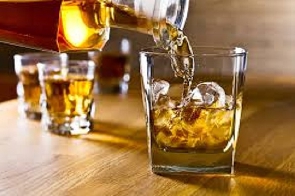 Celebrities have been banned from advertising alcohol
Celebrities have been banned from advertising alcohol
The Supreme Court has deferred its judgment in the case filed by Mark Darlington Osae against directives that banned celebrities from appearing in alcoholic advertisements to April 24, 2024.
The apex court panel of seven had initially set Wednesday, April 10, for its judgment.
However, uncertainties surrounding the date for the celebration of Eid-ul-Fitr following a month of Ramadan fast played a part in the adjournment.
The Food and Drugs Authority (FDA) issued directives that placed a ban on celebrities from advertising alcoholic beverages.
The FDA’s directives, which prohibited the use of celebrities in promoting alcoholic beverages, were aimed at protecting minors from being influenced by celebrities into alcoholism.
Mark Osae, the manager of Reggie ‘N’ Bollie and Skrewfaze, dissatisfied with the directive, filed a writ at the Supreme Court on November 11, 2022, arguing that the FDA’s 2015 regulations discriminate against the creative arts industry.
The plaintiff, also a music publisher at Perfect Note Publishing and Chairman and Co-Founder of Ghana Music Alliance, wants the Supreme Court to nullify the regulation.
Mark Osae argued that the FDA directive, which stated that “no well-known personality or professional shall be used in alcoholic beverage advertising,” is inconsistent with and in violation of Articles 17(1) and 17 (2) of the 1992 Constitution, which guarantee equality before the law and prohibit discrimination against persons based on social or economic status, occupation, among others.
Before the action was initiated at the Supreme Court, some stakeholders in the creative industry including Wendy Shay, Shatta Wale, Brother Sammy, Kuami Eugene, and Camidoh, had spoken against the law and called for its repeal.
The FDA’s directives discourage the use of celebrities in the promotion of alcoholic beverages through any medium.
This policy is part of the government of Ghana's efforts to protect children and young people from alcohol marketing.
However, the plaintiff argues that this child protection measure would deprive the entertainment industry of potential streams of income.
In the writ issued on November 11, the plaintiff argued that these areas of the FDA’s 2015 regulations constitute discrimination based on economic status and occupation, among others.
The artist, manager, and music publisher are thus asking the Supreme Court to declare unconstitutional the guidelines which stipulate that, “No well-known personality or professional shall be used in alcoholic beverage advertising.” Mr. Darlington Osae is the Chairman and Co-Founder of Ghana Music Alliance.
Reliefs:
(a) A declaration that, on a true and proper interpretation of Article 17(1) and (2) which guarantee equality before the law and prohibit discrimination against persons on grounds of social or economic status, occupation, among others, Guideline 3.2.10 of the Guidelines for the Advertisement of Foods published by the 1st Defendant on 1st February 2016, which provides that “No well-known personality or professional shall be used in alcoholic beverage advertising,” is discriminatory, inconsistent with, and in contravention of articles 17(1) and 17 (2) of the 1992 Constitution, and thus unconstitutional.
(b) A declaration that, on a true and proper interpretation of Article 17(1) and (2), Guideline 3.2.10 of the Guidelines for the Advertisement of Foods published by the 1st Defendant on 1st February 2016, which prohibits well-known personalities and professionals from advertising alcoholic products is inconsistent with and in contravention of articles 17(1) and 17 (2) of the 1992 Constitution which guarantee equality before the law and prohibits discrimination against persons on grounds of social or economic status, occupation, amongst others and consequently null, void, and unenforceable.
(c) An order striking down Guideline 3.2.10 of the Guidelines for the Advertisement of foods published by the 1st Defendant on 1st February 2016 as being inconsistent with and in contravention of the letter and spirit of the 1992 Constitution and as such nullify.
(d) An order of perpetual injunction restraining the Defendants, their agents or servants or assigns under the pretext of acting under Guideline 3.2.10 of the Guidelines for the Advertisement of foods published by the 1st Defendant on 1st February 2016 from doing anything to prevent any well-known personality or professional from advertising alcoholic products.